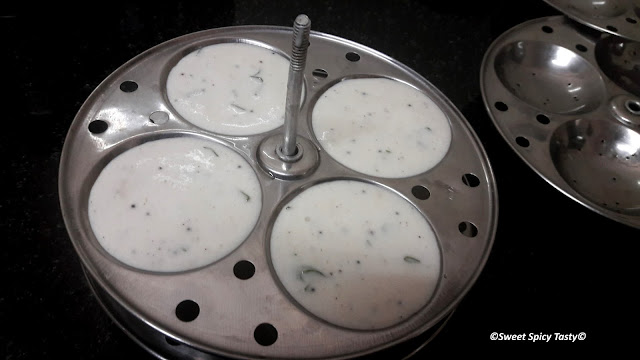The name Kancheepuram/ Kanjivaram is synonymous to Pattu Saree popularly known as Kanjivaram Pattu. The handloom industry with skilled workers make the best of Silk Sarees that are woven with beautiful and intricate designs ,styles and motifs.
Next to Sarees,the city is known for the very many temples and most importantly the famous Varadaraja Perumal Temple where this idli is offered as Prasadam to the Lord.
Next to Sarees,the city is known for the very many temples and most importantly the famous Varadaraja Perumal Temple where this idli is offered as Prasadam to the Lord.
The authentic recipe doesn't use idli rice/parboiled rice as it is an offering/prasad ,but when making at home we can make use of idli rice. Any prasad /offering generally doesn't make use of idli rice or parboiled rice as per customs.
These idlis are slightly different as compared to the regular idlis as the batter is ground slightly coarse in texture and tempered with some spices like pepper,ginger and curry leaves.Also,traditionally these idlis are steamed in mandhara elai Dhonnais (eco friendly cups made out of dried leaves) .
The other name for Kancheepuram Idli is Kudalai Idli as it is steamed in the Dhonnai.
Where can you find the Dhonnais / eco friendly leaf cups ?
Go to a store where they sell items related to Pooja like mud diyas, cotton wicks , photo frames of God and Goddesses . These stores usually sell these dhonnais and also leaf plates which is used to serve prasad during any festive occasion in temples as well as homes . Ask for leaf cups and they will show you various sizes,pick the size you like . Wash it well before you steam the idlis.
Kancheepuram idlis can be served with Coconut chutney and Sambar .Many people like the combination of Tomato Khara Chutney with these idlis.We at home like to have it with Idli Molagapudi and sesame oil along with the other accompaniments .
Kancheepuram idlis can be served with Coconut chutney and Sambar .Many people like the combination of Tomato Khara Chutney with these idlis.We at home like to have it with Idli Molagapudi and sesame oil along with the other accompaniments .
I am thankful to Mayuri ji for introducing me to the food group on Facebook started by Renu which focuses on redoing our old posts. As bloggers when we began we would have clicked photos or posted about the recipe in a simple manner,but with time we would love to update either the write up or the photos of the recipe which will be more appealing for our readers. This group Foodies_Redoingoldposts on Facebook gives us a good momentum and push to look up our old posts and update them . So inspired by this group's activity I have updated this post on Kanjivaram Idlis with new photos and write up on August 7 - 2022
Preparation Time : 10-12 hrs
( Soaking Time : 3-4 hrs |
Fermentation Time : 8-10 hrs)
Cooking Time : 20 mins
Serves : Makes about 16-20 idlis
Complexity : medium high
Ingredients
Cooking Time : 20 mins
Serves : Makes about 16-20 idlis
Complexity : medium high
1 cup udad dhall
1 cup idli rice
1 cup regular raw rice ( I used Sona Masuri.,donot use basmati )
1 cup idli rice
1 cup regular raw rice ( I used Sona Masuri.,donot use basmati )
**you can also use 2 cups raw rice and skip idli rice if making for prasad /neivedhiyam
To Temper
2 tsp jeera/cumin
2 tsp ginger powder/ chukku/shunt
2 tsp pepper powder
pinch of asafoetida
finely chopped curry leaves
2 tsp gingelly oil/sessame oil/til oil
Method
2 tsp ginger powder/ chukku/shunt
2 tsp pepper powder
pinch of asafoetida
finely chopped curry leaves
2 tsp gingelly oil/sessame oil/til oil
Method
Grinding the batter
Wash the rice and dhall separately until the water turns clear. Soak them separately for atleast 4 hrs.
It is best to use wet grinder to grind the batter . Incase of using a mixie/blender ,make sure to use cold water while grinding the udad dhall.
Grind the udad dhall first using very little water until it feels fluffy and almost doubles in volume.
Grind the udad dhall first using very little water until it feels fluffy and almost doubles in volume.
Drop a small blob of the batter in a cup full of water ,the blob of batter must float and not sink. This is the desired consistency of udad dhall batter for soft and fluffy idlis .
Take it out in a separate vessel that is wide enough. Next add the rice to the grinder and grind it well but not very smooth.let it be a little coarse. Add this to the udad dhall batter and mix it well using your hands.
Please Note,using hands to mix the batter helps in fermentation process as our body heat is transferred in the process of mixing. Leave it aside for fermentation . It will take 6-10 hrs depending on the outside temperature and season.
Prepare the tempering using jeera and asafoetida.Add the tempering along with the finely chopped curry leaves,dry ginger powder ,pepper powder and salt.Mix well
Grease the idli plates with a little oil and prepare the steamer/ pressure cooker by then with sufficient water. Pour the batter into the greased idli moulds and steam for 16-18 minutes or use the tooth pick test to check if the idlis are done .
If you want to steam them in the eco-friendly leaf cups (donnais) then pour the batter into those cups and place them in the steamer and steam it as always .
 |
| Steamed Idlis |
Soft and fluffy idlis are ready to be served.
Alternatively,you can also grease a round mould and steam the batter in it and cut in desired shapes .Just like how you would do for a cake or dhoklas.
Incase, you feel the batter is not risen well, you can add some eno fruit salt before steaming. Take care to add eno only to the quantity of batter to be steamed and not to the entire batch of batter.
Incase, you feel the batter is not risen well, you can add some eno fruit salt before steaming. Take care to add eno only to the quantity of batter to be steamed and not to the entire batch of batter.











These idli sound amazing. I love the addition of the tadka.. will have to try this. I have always made plain idli.
ReplyDeleteA nice fluffy and soft kanjivaram idli recipe. The first time I had kanjivaram idli was a memorable one as I was intrigued by it being steamed in a banana leaf. I like the explanation you have given to how this idli is called kanjivaram idli.. interesting read Priya.
ReplyDeleteI love these idli, they are tasty and can be eaten by itself. Good to know about the significance of the name.
ReplyDeleteI must make some of these yum kanjivaram idlis. I always wanted an authentic recipe and now I know I can use yours. Thanks.
ReplyDelete